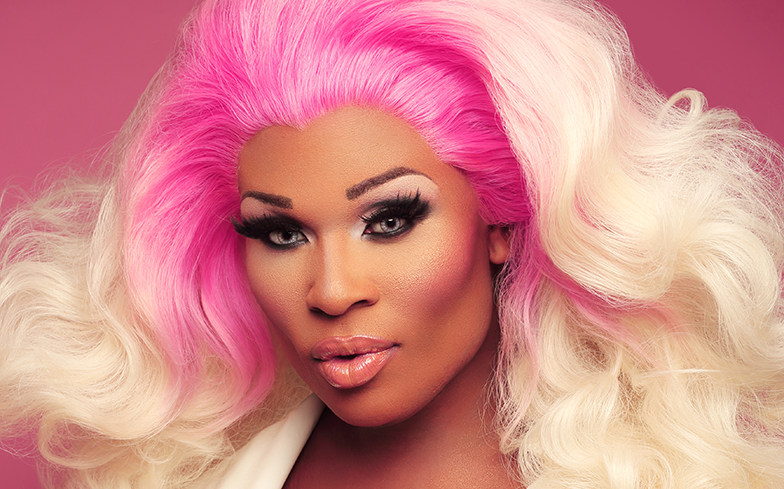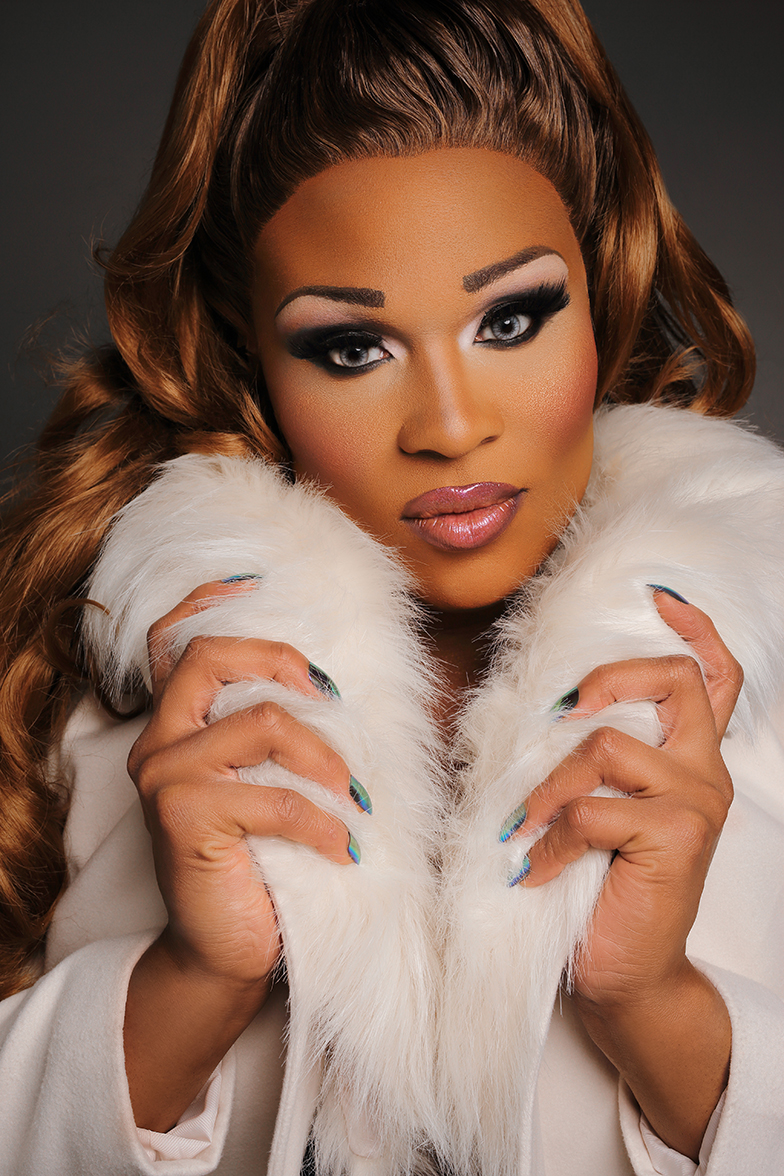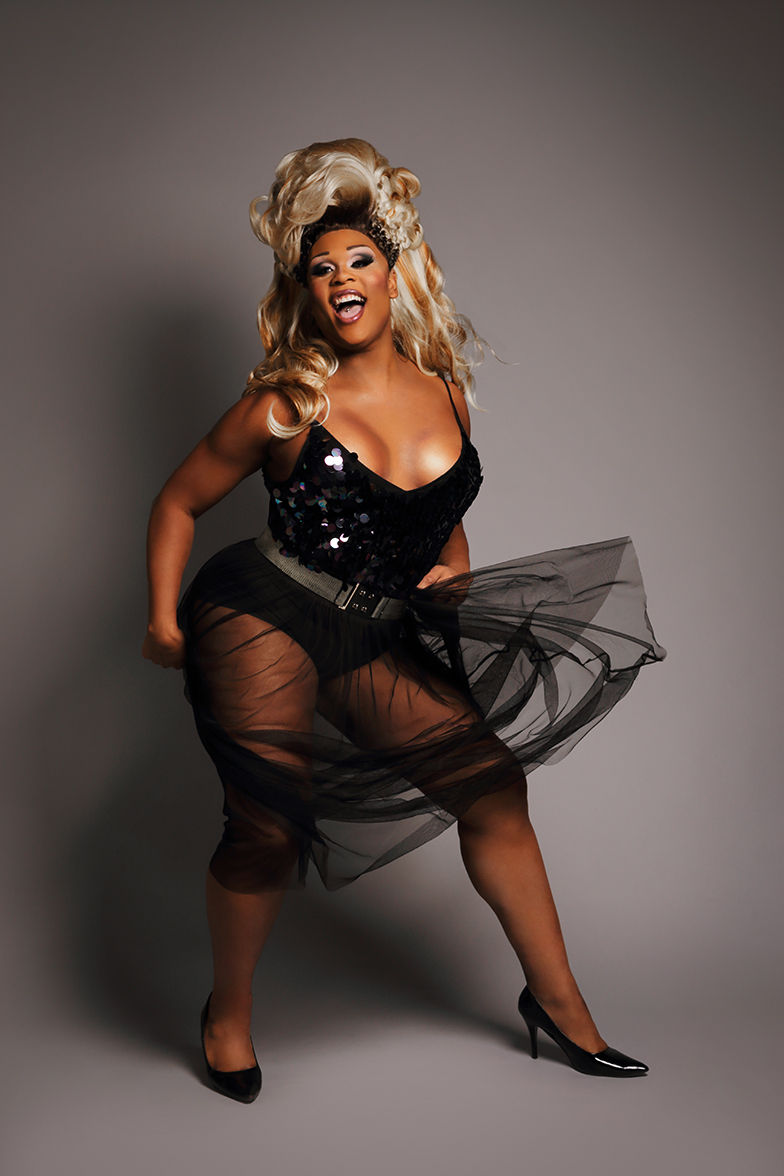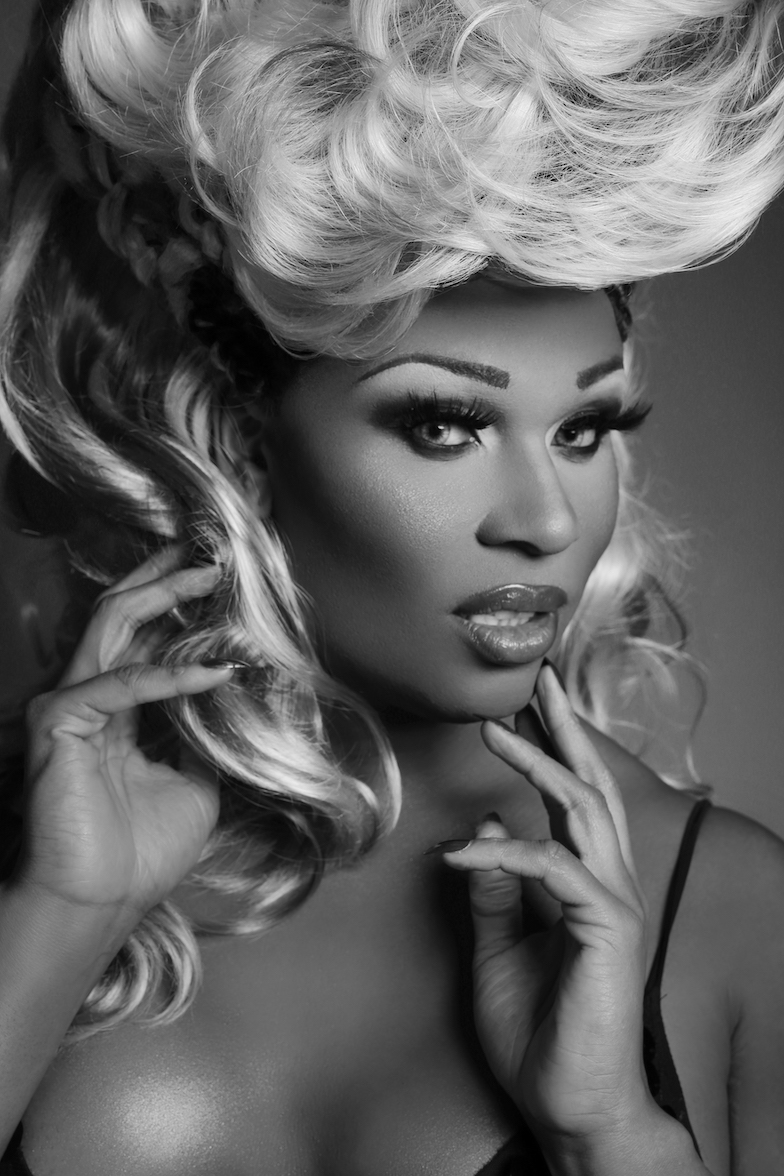
“I’m not comfortable allowing our allies and our neighbours to be silent anymore. I’m going to begin to hold everyone I can accountable in the fight towards helping our community.”
Last year, Drag Race star Peppermint became the first trans performer to originate a role on Broadway for her role as Pythio in the jukebox musical comedy, Head Over Heels, which featured music from the all-female American rock band The Go-Go’s.
It was a monumental moment for the trans community, who are continuously ignored by the entertainment industry. We’ve had blockbusters and Academy Award winning films about trans people, but where are the trans people in these roles? Behind-the-scenes? In the writer’s room?
“The best way to tell those stories, whether you’re an actor, director, writer, is to include the voices of the people who have lived them,” Peppermint tells us. “Whether that means having them on set, behind-the-scenes, on camera, in a starring role, contributing, writing, directing, whatever, in any way you can.
“It’s not about saying, ‘You’re a cisgender actor, you can’t play a trans role.’ The key is having more trans people on these projects. How can we give them the opportunity to positively affect the authenticity of this project?”
As a trans woman of colour, Peppermint is understandably passionate about attainting the same rights as your average gay white man. She often incorporates activism into her music, most notably in Blend and its video, which interspersed news clips of trans-related discrimination, including the murders of several trans women in the United States and Trump’s transgender military ban.
Because of the current state of trans rights in the world and the United States, we sat down with Peppermint to discuss how cisgendered white people can do their part in aiding the community, fighting back against Trump, and why you shouldn’t be threatened by the black and brown eight-striped Pride flag.
I’ll start with some easy questions before we lay into the tougher stuff. Your video for A Vision For Nowness is amazing, how did that come about?
A Vision For Nowness is a song that I sang in the Broadway performance of Head Over Heels, which I completed this January, it’s an original song by The Go-Go’s. In the show, I played the role of Pythio, who is a non-binary character, and it really allowed me to explore so much about gender and identity, and also Greek mythology, Shakespeare, light and magic. So I wanted to include all of those things in a music video. Now of course, most theatrical performances don’t allow you to, we don’t have the luxury of seeing them on our television screens or computers, so in order to see it, you have to buy a ticket. So there’s lots of people in other parts of the world who couldn’t make it to New York City to see the fabulous show, so I wanted to recreate my performance in the show in a pop music video format. It’s not the same experience as the show of course. It’s a different version, it’s a remix, but I wanted to do something to commemorate the fact that I was on Broadway! And it was such a thrilling, memorable time for me and I think it was a moment that resonated with the people who got to see it.
You’ve only released one album to Spotify, Black Pepper, even though you have three overall. Can we expect more albums from Peppermint in the future?
Absolutely! Music is in my life. I’m working on new music as we speak. Friendly fact, I was the very first drag queen to ever have a music video to play on Logo, the channel Drag Race was previously on, for a song called Servin’ It Up. And so, because of that, I’ve had the opportunity to travel. The first place I ever travelled outside of this country was to London, and so my music career has brought me to several places such as London, Australia, Dublin, all over the world, places queens were not travelling to from the United States to perform their own original pop music. Now, it seems basic, like everyone does it, it’s the perfunctory thing that happens. You get on Drag Race, you have a song, you have an album… So it gets lost in the shuffle. But I am working on re-releasing my last albums, because our minds and our knowledge only allow us to expand as far as the first page of whatever Google search pops up!
You have a collaboration with Trinity The Tuck on her upcoming album. Can you tell me what we can expect from that?
She didn’t give me permission to! [Laughs] But it’s a really fun, kind of vicious song. First of all, Trinity is known for being this sharp, silver-tongued, really witty and kind of kunty queen! She is super competitive, right? We know that from season nine, so the song is a homage to her styling of reading. It’s called I Call Shade, which is one of the catchphrases she had on the show. She allowed me to jump into the shadier side of Peppermint, which a lot of people haven’t seen, so hopefully people will like it.
You’ve always been an activist, but how has your life and platform been elevated since appearing on Drag Race?
I’ve had the opportunity to meet more people and my voice has carried a lot further. Doing reality TV allowed me to meet people that I never would have met, places that I never would’ve been able to go. Along with that, bringing the same type of entertainment that I enjoy and being able to speak on the issues that continue to be important to me. Hopefully, it’s inspiring in some way and will resonate with some people who feel like they don’t have a voice.
You became the first openly trans woman to appear on the show, and then Gia Gunn became the first openly trans woman to participate on All Stars. Do you see more trans contestants on the show in the future despite RuPaul’s comments last year?
Oh I hope so! I see more trans people in the future. I see trans people doing everything. It’s not new. We’ve always been in the room, we’ve been in every doctors office, every job, every platform, we’ve been everywhere, but we haven’t always been recognised. It hasn’t always been safe for us to announce ourselves, so I think we will be seeing more trans people and more stories of gender diverse people, more non-binary people, more gender-fluid people, more genderqueer people, more bisexual people in public spaces, in entertainment. Even in public office, we have a drag queen politician, her name is Marti Gould Cummings, who is running for office. I think we’re going to be seeing more queer and gender diverse people in all aspects of life, it’s inevitable. Drag Race included!
Where do you see Drag Race in the future in terms of diversity?
Drag Race has become a guiding light in the world of drag and has introduced drag to so many people who may never have had access to it. And drag is contagious, I don’t care who you are. Everyone loves drag, and everyone, when they have the opportunity to do it, loves getting in drag! And so it’s like a venereal disease we all enjoy. And so it’s impossible not to see the influence of Drag Race in pop culture. We’re seeing the catchphrases and the sayings and the attitude and the fierceness, even in other TV shows that have nothing to do with drag. It’s such a phenomenon that it has already affected the viewers and the fans and pop culture and the general population, and that’s gonna come rolling right back, and more diverse people are going to want to participate. Maybe they’ll be other shows that are similar? So I’m really interested to see Drag Race continue to be at the forefront of leading and being cutting edge and introducing new things.
I saw on Twitter that you support the black and brown stripes on the Pride flag. There’s been backlash about it, especially from white people. Why do you think they’re so threatened by it?
I think that it’s important to acknowledge the thoughts and the feelings from the people in our community. There’s something I’ve been aware of for a very long, is that when people refer to the gay community, sometimes they would mean trans people, lesbians, bisexuals, but unfortunately, what we’re filtering through is one image, one type of person in the community. And a lot of the time, it’s a gay white man. Historically, in gay representation, in entertainment, politics, it’s a gay white man. It’s how it’s been. And while they were some important, beautiful stories, there are so many other stories of people in our community that intersect with everything, people of different races, of different genders, different nationalities. I think the concept of openness and equality only works if it’s a two-way street. In order for us to gain access to their spaces, whether it’s marriage equality or equal rights to vote, pay equality, gender equality, marriage equality, we have to allow those people access to our spaces. Which means sometimes changing how we describe ourselves, because we need to make room for more types of people. In order for those people to be seen and to feel represented and to feel heard authentically, sometimes we need to change our moniker. Sometimes it means to go from gay to gay and lesbian, LGB, LGBT, LGBTQ, LGBTQIA+ to queer. Sometimes you need to go from a rainbow flag to including the trans colours, including black and brown people in these conversations. A lot of people may say, ‘What’s the point in doing it? It stands for everyone.’ But the willingness to include those colours in the flag speaks less to having a new fashion on a flagpole, but it speaks more to the acknowledgment of the importance of including people of colour and allowing them to be seen in every single moment that the Pride flag is representing.
Why do you think there is so much hatred within our own community?
It really is difficult. We are very focused on self and our own self-identity and that is very important. But I think that it’s important for us to acknowledge intersectionality. Like, ‘You and I may be gay, but if you’re a Muslim and I’m a Christian, there’s a difference there.’ We need to be able to work together. If somebody’s black and somebody’s white, but they’re both lesbian, it doesn’t change that, but a black lesbian’s experience is definitely going to be different than a white lesbian’s experience. And it’s about that intersectionality, everyone has layers, and all of our layers are different. Now that we’ve understood that we’re all queer and we’re all in this community, it’s important that we take a moment to really have empathy and understand that there is such a thing as privilege and access. Some of us have more privilege and access than others, and so it’s about making room for people who do not have the same privilege and access.
The trans community has a long way to go in the entertainment. Scarlett Johansson accepted a trans role, and then backed out because of backlash, rightfully so. And over the past week, it was revealed that Diego Luna from Star Wars is about to play a trans woman in an upcoming romantic comedy. Why do you think trans people are still not being given these opportunities?
I think the bigger question is: How can we include trans people in mainstream art? How can we include more minorities in mainstream art? It’s not necessarily about excluding a cisgender actor from playing a role, it’s about giving an opportunity to trans people to play more roles, and envisioning a world where an actor can play any role that includes cis and trans people playing trans and cis roles. Telling interesting stories is something that Hollywood has always wanted, and so I think authentic cisgender actors want to tell those stories in a good, entertaining and impactful way. And the best way to tell those stories, whether you’re an actor, director, writer, is to include the voices of the people who have lived them. Whether that means having them on set, behind-the-scenes, on camera, in a starring role, contributing, writing, directing, whatever, in any way you can. It’s not about saying, ‘You’re a cisgender actor, you can’t play a trans role.’ The key is having more trans people on these projects. How can we give them the opportunity to positively affect the authenticity of this project?
Trans people are being regularly attacked and killed in the United States, with 24 known trans people being killed last year alone, most of whom were trans women of colour. Why is this happening? What can we do to prevent this?
I think this is a part of it. It’s easy to victimise people who are oppressed and in the shadows. Queer people, trans women of colour are facing some of the same disadvantages and road blocks that white gay men were facing in the past. They were not able to hold their jobs when they were found out for being gay, they were not able to have healthy relationships out in the open for fear of being attacked. This is the same thing that trans people, especially women of colour, are facing. The key is highlighting the lives and the stories of trans women of colour in a positive way, on television, in the media, and to not stigmatise our partners and the people who associate with us and surround us with love. Trans women of colour are plagued with unemployment and poverty which forces us into situations of survival, sex work, which can be connected to substance abuse and depression. This is a self-perpetuating cycle that trans women of colour are thrown into around the world, and so giving opportunities for us to showcase our talent is the number one way, that I believe, we can lower the murder rate.
As a trans women, how does it feel to see the Trump administration attacking your community, especially with the Supreme Court approving his request to ban transgender people from the military?
It’s devastating. I was devastated with the military ban and I’ve been devastated with every announcement that Trump and his administration has made regarding the transgender community since he’s been in office. Every utterance of the word ‘trans’ or ‘LGBTQ’ has been in reference to denying us access to something. That happens to be quite the opposite of what he promised to do. I did not vote for him, but he certainly was talking about being the best president for LGBTQ people and he only once mentioned the community publicly when he was running and campaigning. Ever since then, he’s denied us access to something that all Americans should have access to. But I’m not worried, it fuels me and angers me enough to motivate our community and our allies to step up to the plate. I’m not comfortable allowing our allies and our neighbours to be silent anymore. I’m going to begin to hold everyone I can accountable in the fight towards helping our community get to where it needs to be.
And how can allies, especially cisgendered white people, do their part in aiding the trans community? How can they step up?
There’s so many ways. It depends on what people have access to, whether they’re famous, whether they have a platform, or someone in every day life who doesn’t have those markers, it’s speaking when you can, calling attention to it. It’s having those uncomfortable conversations with people when there are no other minorities in the room, with our family members, co-workers. And then really showing up for these people. Whenever there’s a moment that someone in the trans community or the LGBTQ community or any other minority community, asks for your help, show up and volunteer your help whenever you can. Whether that’s marching, whether that’s signing a petition, or standing outside in the cold in front of the government building, boycotting certain services or companies, there’s many ways to protest. But making your voice heard and showing people that you care about our community and that you love these people is the number one way that things are going to change.
Why do you think celebrities with so much power, with millions of followers, can’t take a moment to send a tweet that simply says, ‘I stand with the trans community’ or ‘I stand with queer people of colour.’ If they wrote one simple sentence, they could change perceptions of thousands of fans.
I often ask myself that. It’s a question I ponder all the time darling! I can’t speak for those celebrities, but I find it perplexing. As a queen for many years, years before I was on Drag Race, my sense of charity, activism and speaking out for my community has always been at the front of what I do. If you were gonna be around me, you were gonna hear it. It’s gonna be on my social media, I’m gonna speak about it. There’s some really brilliant examples of celebrities who use their platforms, and it’s disappointing to me, that we don’t explicitly get to hear from other celebrities. Sometimes they’ll tweet out an emoji when something goes wrong, but they don’t really use their words in a powerful way. On one hand, celebrities are not politicians. They’re certainly not all well spoken. They’re certainly not all gifted in the art of public speaking and activism. Everyone isn’t born with that skill or passion, but I do believe that there are some celebrities who don’t wanna damage their future potential for earning money or partnerships with different businesses. The less people speak out politically, then the more viable they are because they have absolutely zero convictions. And there’s nothing prickly about their public appearance so they’re safe, they’re safe for everybody to use and make money off, liberals, conservatives. I learned this after Drag Race – whatever the issue, whenever you say your opinion, 50% of people will agree and 50% of people will disagree, no matter what it is. You could say ‘I like pizza’ but oh honey, some people will come after you. So I can understand why celebrities don’t want to have a battle every time they put out a tweet, but there are some really important moments and I’m one of the people who will always speak out. I guarantee you, when I see these celebrities, I will have conversations with them and try to urge them to join us in the fight for equality in public. There’s a quote from Cornwell West. It says, “Justice is what love looks like in public.” And so, using our public platforms is the true justice, is the true example of love. So if you’re not gonna do that, we know where you stand.
For celebrities, especially women in pop, 80% of their fanbases are the LGBTQ community. You don’t have to be a politician, you don’t have to be well spoken. It takes one tweet to show your support. That’s all it takes. If you lose half your fanbase, who cares? You still have millions of followers?
I agree. I’m baffled, bewildered, I don’t understand, I don’t know why. And I have to be honest, there have been moments of tragedy that are cause for outrage, where I have been on a plane and I missed it, where I’ve not spoken out. I’m not perfect. So I think we do need to give people that room. But when it comes to general statements about being an ally and showing the community that you stand, I think it’s really important. I wish I had the answer. There’s another quote. Martin Luther King said: “The ultimate tragedy is not the oppression and cruelty by the bad people, but the silence over that by the good people.” It’s to these celebrities who have decided to use our services to allow us to make them look pretty, to design their costumes, to choreograph their dances, to background dance for them, to make their entire production look better, to inspire them through our fashion and our videos that don’t have millions and millions of views. It’s no longer acceptable.
Watch Peppermint’s sickening video for A Vision of Nowness below.
Photography Arron Dunworth
Related: Aja is ready to “pull a Naomi Campbell” on you and your stupid questions.







